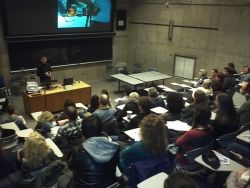AUDIO about SolidarityPeace/War posted on Décembre 6, 2011 by clkates
Ghetto Palestine: Jon Elmer brings strategic analysis of Palestinian resistance to UBC
Jon Elmer's complete talk was recorded by Melanie Spence of People's Health Radio. The full audio of the lecture is available for download at the BIAC website. (Click here to download, mp3, 98 MB)
Ghetto Palestine: Jon Elmer brings strategic analysis of Palestinian resistance to UBC
Students and community members filled Woodward Library 1 at the University of British Columbia on Friday, December 2, 2011 to hear Canadian writer and photojournalist Jon Elmer speak about his analysis and experience of "Ghetto Palestine." Elmer is based in Bethlehem, Palestine (and has previously been based in Jenin and Gaza City), and his work has been published in the Journal of Palestine Studies, Le monde diplomatique, The Progressive, Al Jazeera English, and many others.
Elmer's talk, analyzing the challenges and possibilities for Palestinian resistance to Israeli occupation, was sponsored by Solidarity for Palestinian Human Rights at UBC (SPHR-UBC) and co-sponsored by the Boycott Israeli Apartheid Campaign (BIAC) and Samidoun Palestinian Prisoner Solidarity Network.
Elmer began from the concept of "Ghetto Palestine," the "context in which the political struggle of resistance to Israel is taking place." He discussed ghettoization in Gaza and the West Bank by means of "disengagement" in Gaza, creating the Apartheid Wall, and settlement building, as a means of attempting to create an exclusively Jewish state in Palestine while attempting to delay a global recognition of the apartheid analysis. He noted that Israeli politicians openly discuss the concept of apartheid in Israel, while internationally, "over the past 10 years, campuses have banned even the use of the word Apartheid" in describing Israel.
"Settlements need to be understood as military positions - as geopolitical positions," said Elmer. He contested the common juxtaposition of "violent" and "non-violent" struggle as a Palestinian option, noting that "There are over 100 mechanized invasions of the West Bank every week. The struggle is inherently a violent struggle." He also noted that "we need to be careful when we talk about nonviolence to avoid suggesting that it's new, because it's not," describing Palestinian nonviolent and mass resistance that has been the mainstay of Palestinian existence since the beginning of the struggle.
He made a related point, issuing "a word of caution on the use of the term 'Arab Spring,' which implicitly suggests that it's new, where each of the magjor states where uprisings have happened...uprisings have been put down in every decade, in every generation." He remarked on some of the strategic changes for Palestinian resistance, particularly in light of the uprising in Egypt and subsequent changes on the international level.
Elmer devoted particular attention to the Israeli assassination campaign against Palestinian activists, and the use of mass political imprisonment, to devastate the Palestinian political scene. "If you look at Bethlehem, where they carried out 50 assassinations - think of making a list of political organizers in Vancouver, and crossing them off one by ne. Most of the leaders assassinated and the rest in prison, with life sentences, locked away...it takes time for Palestinians to regenerate their human capacity."
He discussed the recent prisoner exchange and the capture of Israeli soldier Gilad Shalit by Palestinian resistance organizations, noting that the capture of Shalit was "a Palestinian direct action that, for the first time, independent of the diplomatic initative, without an Israeli mistake, within occupied territory, was able to carry out an operation...that 5 years later will have liberated 20 percent of the Palestinian political prisoner population. That is a dynamic changing event." He remarked that Shalit was "the most humanized tank gunner in history," noting the photos of Shalit with his teddy bear and family. "The man was on the border of the Gaza Strip as a gunner on a tank that was set up firing shells at the population."
Elmer also addressed Gaza, not only as a site of hardship and repression, but "for all it's a ghetto, it's an open-air prison, it is also the first piece of historic Palestine that Palestinains control on their own," saying that this had "radically changed the dynamic on the ground," referencing not only Palestinians' ability to hold Shalit, but also the self-directed and massively expanded tunnel trade with Egypt, which has gone from being hand-dug tunnels beneath homes through which one could carry only the smallest packages, to paved infrastructure that is capable of importing cars and vehicles. While Israel continues its siege on Gaza, Palestinians, through their own initiative and resistance trade, are bringing in cement and all other materials denied to Gaza; while Israel attempts to strangle Gaza through siege, Palestinians have developed their own trade that has grown the Gaza economy 30% from the earliest days of rudimentary tunnels.
Elmer spoke to the priorities of the solidarity movement, noting that "solidarity activism during this period of time is buying political time and space for the indigenous movement to rebuild" its resistance, particularly in light of the assassination and imprisonment campaigns. He concluded by showing a slideshow of some of his photography of Palestine.
The coordinating organizations announced their future events and activities, including Israeli Apartheid Week for March 2012, which SPHR is planning to organize at UBC in coalition with Vancouver-based Palestine solidarity groups, including BIAC.
The site for the Vancouver local of The Media Co-op has been archived and will no longer be updated. Please visit the main Media Co-op website to learn more about the organization.
